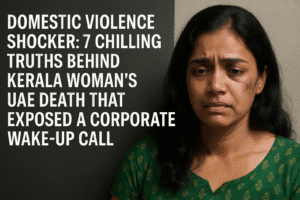Domestic Violence Shocker: 7 Chilling Truths Behind Kerala Woman’s UAE Death That Exposed a Corporate Wake-Up Callare
Athulya Sekhar’s tragic death in Sharjah—on her 30th birthday and first day at a new job—exposes brutal realities of gender violence and systemic failure. Her husband, Satheesh, was fired by his Dubai employer after they witnessed videos of his physical and mental abuse, calling it “shocking” and a “criminal offense.” Athulya’s family alleges years of dowry harassment despite gifting 43 gold sovereigns at marriage, with Kerala Police now investigating murder.
While Satheesh denies involvement and calls her death suicide, her father insists she’d never abandon their 10-year-old daughter, citing his history of alcohol-fueled violence. The case underscores how corporate accountability (rarely seen in such contexts) and digital evidence can force action, yet also highlights how legal systems globally still fail to protect women before it’s too late.

Domestic Violence Shocker: 7 Chilling Truths Behind Kerala Woman’s UAE Death That Exposed a Corporate Wake-Up Call
The death of Athulya Sekhar—a 30-year-old Kerala woman found dead in her Sharjah apartment on her birthday—isn’t just another news item. It’s a harrowing case study of how systemic failures collide with corporate responsibility in the digital age.
The Unraveling
When Athulya’s Dubai-based employer terminated her husband, Satheesh Sivasankara Pillai, it wasn’t over mere allegations. The company acted after witnessing video evidence of his abuse—footage Athulya had courageously documented and shared with her family. This visceral proof forced a corporation to confront a crime typically hidden behind closed doors. Their termination letter explicitly cited his “violent physical & mental harassment” as a criminal offense in the UAE—a rare instance of workplace accountability intersecting with domestic violence.
The Hidden War
Athulya’s story reveals chilling patterns:
- Dowry’s Deadly Grip: Despite providing 43 sovereigns of gold and a motorcycle at marriage, her family alleges relentless harassment for “insufficient” dowry—a toxic demand criminalized yet stubbornly persistent.
- The Birthday Tragedy: She died on the day she was to start a new job—a symbol of hope brutally cut short.
- Documented Abuse: Videos showing Satheesh threatening her with a stool and images of her injuries became posthumous evidence, underscoring how survivors often quietly gather proof while fearing escalation.
Contradictions and Questions
While Satheesh denies involvement and calls her death a “suicide,” her father’s anguish cuts deeper: “She bore torture for her daughter’s sake.” Kerala Police have registered a murder case citing visible injuries and prior domestic violence reports. The disconnect between his narrative and the evidence raises urgent questions about how abuse is minimized.
Broader Implications
- Corporate Moral Duty: The company’s swift action sets a precedent. Should workplaces proactively screen for domestic violence? Can HR departments become allies for at-risk employees?
- Immigrant Vulnerability: Like many Indian families in the UAE, Athulya’s isolation may have intensified her risk. Support networks for expat survivors remain fragmented.
- Digital Documentation: Athulya’s videos highlight how technology can expose abuse—but also how evidence alone isn’t protection without systemic intervention.
A Child Left Behind
The couple’s 10-year-old daughter now embodies this tragedy’s longest shadow. Her future underscores the intergenerational trauma of gender violence.
The Path Forward
Athulya’s death demands more than outrage:
- Corporate Policies: Global companies must create protocols to support—not just terminate—abuse victims.
- Dowry Enforcement: India’s Dowry Prohibition Act requires aggressive implementation, not just reactive cases.
- Cross-Border Justice: With investigations spanning Kerala and Sharjah, coordinated legal action is critical.
This isn’t about one man’s crime. It’s about how societies, corporations, and legal systems fail women until it’s too late—and how courage, like Athulya’s, fights back even in darkness.
If you or someone you know is experiencing domestic violence:
- UAE: Contact Dubai Foundation for Women & Children (800111)
- India: National Commission for Women Helpline (7827170170)
- Global: Reach the International Domestic Violence Hotline at www.hotpeachpages.net
You must be logged in to post a comment.